新概念英语第一册第61-62课
Lesson6162(课件)新概念英语第一册
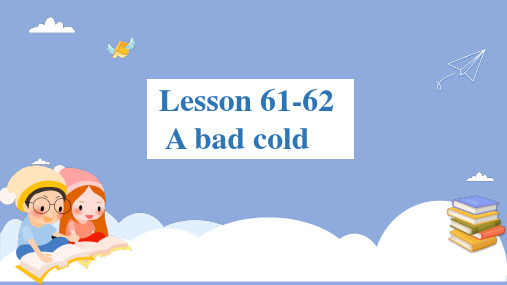
Text
Q1.What’s the matter with Jimmy? Q2.What must Jimmy do?
Q1.Whatwenku.baidu.coms the matter with Jimmy? He feels ill. He has a bad cold.
Q2.What must Jimmy do? He must stay in bed for a week.
1.Lucy has_______(A.a cold B.cold) 2.I have _______(A.a headache B.headache) 3.He has ______(A.a flu B.flu) 4.She has____(A.a toothache B.toothache) 5. We have_____(A.a measles B.measles)
4. I have a flu.
her
去掉a
They all feel terrible.
What must they do?
What must they do?
What must they do? They must go to hospital.
What must they do? They must see a doctor.
MR.WILLIAMS: He looks ill. MRS.WILLIAMS: We must call the doctor MR.WILLAMS: Yes, we must.
新概念英语第一册61_62课课件
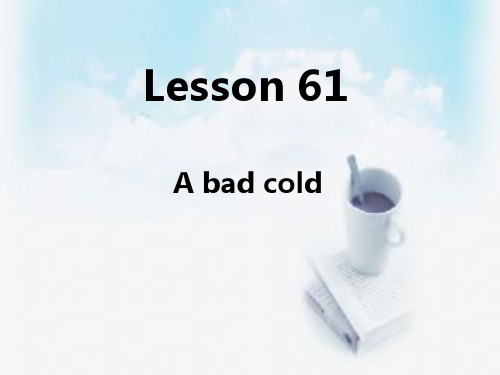
HOMEWORK: 1.Remember the words. 2.Recite the dialogue .
THANK YOU FOR YOUR LISTENING!
放映结束 感谢各位批评指导!
谢 谢!
让我们共同进步
Fra Baidu bibliotek
知识回顾 Knowledge Review
toothache have a cold backache have a bad cold Stomachache have flu 流感
have measles 麻疹 have mumps 腮腺炎 take (have) an aspirin take (some) medicine
What’s the matter with them?
He feels ill.
He looks ill.
We must call the doctor.
Yes, we must.
What's the matter with him?
What’s the matter with…? 常用来询问人或事物的状况,
常作“是否有问题?”“有否有 麻烦”讲。 feel ill 感觉病了,指自我感觉 look ill 看起来有病,指外表形象
What’s the matter with him, doctor?
新概念英语第一册第61-62课听力:A bad cold

新概念英语第一册第61-62课听力:A bad cold
Lesson 61 A bad cold重感冒
Listen to the tape then answer this question.What is good news for Jimmy?
听录音,然后回答问题。吉米有什么好消息?
MR WILLIANMS: Where's Jimmy?
威廉斯先生:吉米在哪儿?
MRS WILLIAMS: He's in bed.
威廉斯夫人:他躺在床上。
MR WILLIAMS: What's the matter with him?
威廉斯先生:他怎么啦?
MRS WILLIAMS: He feels ill.
威廉斯夫人:他觉得不舒服。
MR WILLIAMS: He looks ill.
威廉斯先生:他看上去是病了。
MRS WILLIAMS: We must call the doctor.
威廉斯夫人:我们得去请医生。
MR WILLIAMS: Yes, we must.
威廉斯先生:是的,一定得请。
MR WILLIAMS: Can you remember the doctor's telephone number?
威廉斯先生:你还得医生的电话号码吗?
MRS WILLIAMS: Yes. It's 09754.
威廉斯夫人:记得。是09754。
DOCTOR: Open your mouth, Jimmy. Show me your tongue. Say, 'Ah'.
医生:把嘴张开,吉米。让我们看看你的舌头。说“啊——”
新概念英语第一册课后习题及答案:Lesson61-62

Written exercises书⾯练习
A Rewrite these sentences using He.
改写下列句⼦,⽤He作主语。
Examples:
I have a headache. He has a headache.
I must stay at home. He must stay at home.
1 I have a cold. He______
2 I can't go to work. ______
3 I am not well. ______
4 I feel ill.______
5 I must see a doctor. ______
6 I do not like doctors. ______
B Write sentences like those in the example.
模仿例句完成以下句⼦。
Example:
Jimmy/(a stomach ache)/a headache/take an aspirin
What's the matter with Jimmy?
Does he have a stomach ache?
No, He doesn't have a stomach ache.
He has a headache.
So he must take an aspirin.
1 Elizabeth/(an earache)/a headache/take an aspirin
2 George/(a headache)/an earache/see a doctor
新概念英语第一册第61-62课-A bad cold
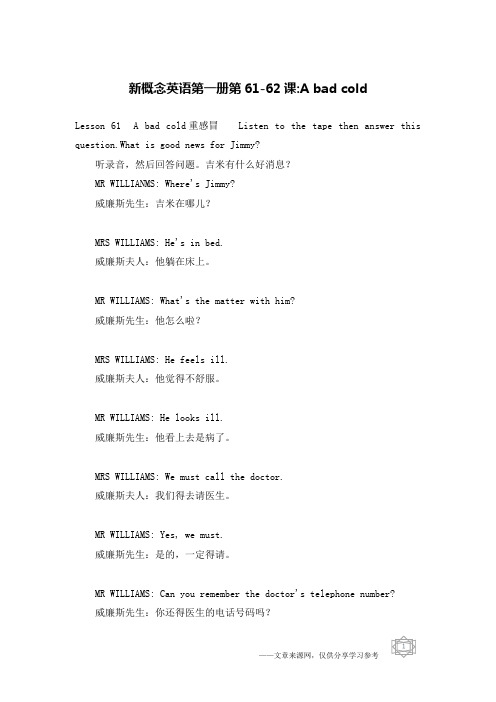
新概念英语第一册第61-62课:A bad cold
Lesson 61 A bad cold重感冒Listen to the tape then answer this question.What is good news for Jimmy?
听录音,然后回答问题。吉米有什么好消息?
MR WILLIANMS: Where's Jimmy?
威廉斯先生:吉米在哪儿?
MRS WILLIAMS: He's in bed.
威廉斯夫人:他躺在床上。
MR WILLIAMS: What's the matter with him?
威廉斯先生:他怎么啦?
MRS WILLIAMS: He feels ill.
威廉斯夫人:他觉得不舒服。
MR WILLIAMS: He looks ill.
威廉斯先生:他看上去是病了。
MRS WILLIAMS: We must call the doctor.
威廉斯夫人:我们得去请医生。
MR WILLIAMS: Yes, we must.
威廉斯先生:是的,一定得请。
MR WILLIAMS: Can you remember the doctor's telephone number?
威廉斯先生:你还得医生的电话号码吗?
MRS WILLIAMS: Yes. It's 09754.
威廉斯夫人:记得。是09754。
DOCTOR: Open your mouth, Jimmy. Show me your tongue. Say, 'Ah'.
医生:把嘴张开,吉米。让我们看看你的舌头。说“啊——”
新概念英语第一册第61-62课课件

关于疾病的一些单词词组
headache earache toothache backache Stomachache have a headache have a fever/temperature. have a cold have a bad cold have flu 流感 have measles 麻疹 have mumps 腮腺炎 take (have) an aspirin take (some) medicine
Lesson 61 A bad cold
Listening
•Who has a bad cold?
New Words
•feel •look •must •call •doctor •telephone remember mouth tongue bad cold news
来自百度文库
Some words about our body
Lesson 62 What’s the matter with them? What must they do?
• She has a headache. 她头疼。 • 根据现代英语习惯,headache前常用不定 冠词a。其他ache型的复合词也多用不定冠 词,如:an earache(耳疼),a toothache (牙疼),a stomach ache(胃疼)。 • take/have an aspirin, 服/吃一片阿司匹 林。 • have a temperature, 发烧。= have a fever. • She has a high fever. 她在发高烧。
新概念英语第一册课后题及答案Lesson61-62
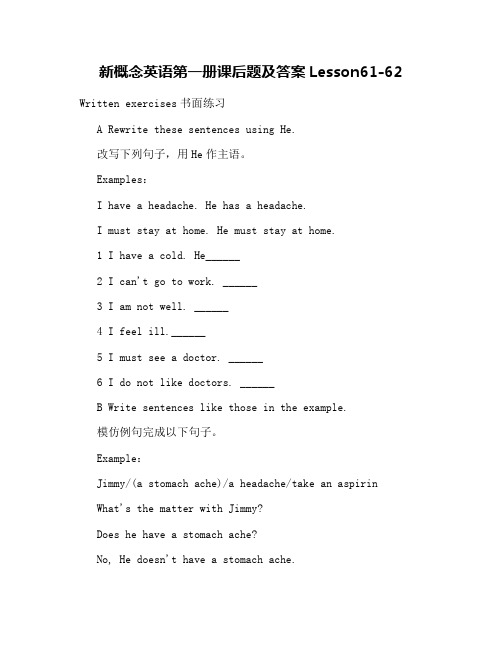
新概念英语第一册课后题及答案Lesson61-62 Written exercises书面练习
A Rewrite these sentences using He.
改写下列句子,用He作主语。
Examples:
I have a headache. He has a headache.
I must stay at home. He must stay at home.
1 I have a cold. He______
2 I can't go to work. ______
3 I am not well. ______
4 I feel ill.______
5 I must see a doctor. ______
6 I do not like doctors. ______
B Write sentences like those in the example.
模仿例句完成以下句子。
Example:
Jimmy/(a stomach ache)/a headache/take an aspirin
What's the matter with Jimmy?
Does he have a stomach ache?
No, He doesn't have a stomach ache.
He has a headache.
So he must take an aspirin.
1 Elizabeth/(an earache)/a headache/take an aspirin
2 George/(a headache)/an earache/see a doctor
新概念英语第一册Lesson61-62

Yes. It's 09754.
Open your mouth, Jimmy. Show me your tongue. Say, "Ah'.
What's the matter with him, doctor?
He has a bad cold, Mr. Williams, so he must stay in bed for a week.
• b. 有些抽象名词可以转化为类名词.例如,bus公 共汽车;by bus乘公共汽车。是一种交通手段.bus 起抽象名词的作用,而bus本身是类名词 • c. 物质名词和抽象名词都是不可分的,也无法用 数目来计算都是不可数名词.其前面不能用不定 冠词a或an来表示量,其后不能变复数形式。 【注意】有些普通名词具有双重性,既可作可数名 伺,又可作不可数名词,但词义上有区别。例如: • glass玻璃(不可数) a glass玻璃杯(可数) • iron铁(不可数) an iron熨斗(可数)
• 普通名词包括可数名词和不可数名词两种。 • (1)可数名词有个体名词(类名词)和集体 名词(集合名词)两种。 ①个体类名词是指一类人或物的总称。例如: • boy(男孩), girl(女孩), boat(船), pen(钢笔). bed(床). orange(橘子) • Is your classmate a boy or a girl? • 你的同学是男孩还是女孩? • Do you prefer an apple or a pear? • 你喜欢苹果还是喜欢梨?
新概念英语第一册lesson61-62

系动词: feel(感觉) look(看起来) taste(尝起来) smell(闻起来) sound (听起来)
他看起来很友好
He looks friendly.
我感到很开心
I feel very happy.
食物闻起来味道很好
The food smells good.
It tastes delicious. 吃着太美味了 That sounds a good idea. 听起来是个不错的主意
情态动词must,can’t,may 表示可能性的区别: must 一定…… 用于肯定句中,表示可能性最大, 例如:The light is on, she must be at home now. 灯亮 着,她现在一定在家。 can’t 不可能…… 用于否定句中,表示可能性最大, 例如:That girl can’t be Kate, I saw her in the shop just now. 那个女孩儿不可能是Kate,我刚刚看见她在商店里。
Yes. It's 09754.
Open your mouth, Jimmy. Show me your tongue. Say, "Ah'.
That's good new for Jimmy.
Good news? Why?
Because he doesn't like school!
新概念英语第1册第61-62课重点语法

⼀、重要句型或语法
1、have的⽤法
表⽰“患病”,如:He has a bad cold。
2、情态动词must的⽤法
表⽰“必须”,如:We must call the doctor.
3、感官系动词
英语⾥感官系动词主要有:look、sound、smell、taste、feel。感官系动词后⾯⼀般接形容词,如:He feels ill. / He looks ill.
⼆、课⽂主要语⾔点
He's in bed. 注意区分in bed(因⽣病等卧床不起)和in the bed(在床上,往往不是因为⽣病)。类似的例⼦还有:in hospital(因⽣病等住院)和in the hospital(在医院⾥,可能是医院的⼯作⼈员或是探望病⼈的⼈等)。
What's the matter with him? What's the matter with sb.?常⽤来询问某⼈出了什么事或是怎么了。matter表⽰“事情;问题”。
We must call the doctor. must为情态动词,表⽰“必须”,本课主要讲must的肯定句和疑问句的⽤法即可。call sb.,给某⼈打电话。
Can you remember the doctor's telephone number? can是情态动词,表⽰“能够”。remember表⽰“想起,记起”。
It's 09754. 注意电话号码⾥的“0”⼀般读作字母O的发⾳。
Open your mouth, Jimmy. 注意mouth与mouse的发⾳区别,以及与month的发⾳和拼写区别。
新概念英语第一册第61-62课

feel
⑴ 觉得;感到:
• She feels tired and thirsty. 她感到又累又渴。
• He is feeling a little better today. 他今天感觉好点了。
⑵ 摸,触;(客体)给人的某种感觉:
打电话给律师
精选ppt
8
remember
Xiaoxin,rem
ember to eat lunch!
remember sth. 记得……
• Do you remember the doctor’s telephone number?
• 你记得医生的电话号码吗?
remember to do sth. 记得去做某事
see 看见,后面加名词或代词,强调看的结果,是实意动词; I can’t see the bird in the sky.
watch 观看,后面加名词,强调欣赏,是实意动词; They are watching the football match.
精选ppt
5
look watch see look at
精选ppt
13
TEXT
精选ppt
14
He’s in bed.
Where’s the Jimmy?
He feels ill. What's the matter with him?
Lesson61-62(课件)新概念英语第一册

By Gaby
1. feel v. 感觉 (感官动词) + adj. (表语) smell 闻起来 + good taste 尝起来 + delicious look 看起来 + pretty (感官动词) sound 听起来 + good
2. look /luk/ v. 看 (起来) Let me have a look. 让我看一看 (实义动词)
2. What’s the matter with him? = What’s wrong with him?
= What happened to him?
Don’t + open your mouth.
3. so he must stay in bed for a week. for + 一段时间, 表示”长达” I have classes for eight hours today. He must stay in Beijing for ten years.
[ɔ:] [ɔ] [u:] [u]
23. flu [flu:] n.流行性感冒 have/has flu 得了流感 bird flu 禽流感
1. He’s in bed. in bed 生病卧床; in the bed 躺在床上
She is in the bed. 她躺在床上。 She is in bed. 她生病卧床。 in hospital 住院; in the hospital 在医院; The man is in hospital. 那个男士住院了。 The nurse is in the hospital. 护士在医院里。
新概念英语NCE1_lesson61-62(共27页)课件
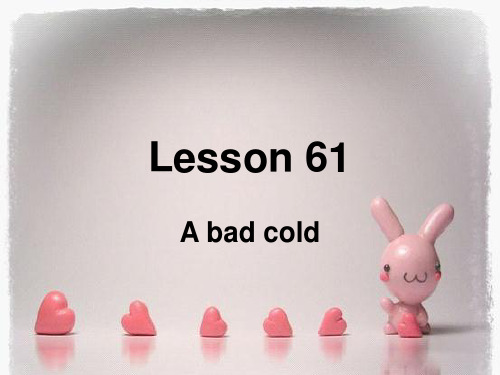
★ Must 情态动词 (can, should, may)
If you want your eyes beautiful, you should always see something good of others.
练习
• 看62课图片,两人一组,完成对话。 • 做书面练习B,模仿例子完成八个小题。
Remember your appointment with the dentist.
Remember to do sth 记得去做某事 Remember doing sth 记得做过某事 I remember you saying so.
Please remember to send me an email.
Lesson 61
A bad cold
本课内容
• 单词学习 • 系表结构 • 课文讲解 • 练习 • 日常用语 • 口语练习 • 作业
• feel • look • must • call • doctor • telephone • remember • mouth • tongue • bad • cold
John's mother told him to look after his younger brother.
新概念英语第一册第61-62课课件

20
A bad cold
Unit 61
MR. WILLIAMS: Where's Jimmy? MRS. WILLIAMS: He's in bed.
MR. WILLIAMS: What's the matter with him? MRS. WILLIAMS:He feels ill.
MR. WILLIAMS: He looks ill.
may 可能…… 用于肯定句中,表示可能性最小, 例如:He may come here today, I’m not sure. 他今天有可能来这里,我不是很确定。
2021/3/30
31
may can’t
must
1. —Who’s that? —That _____ be Jim, but I’m not may
形容词ill(有病的,生病的)作表语。
• 知识扩展:
1、感官动词有:feel感觉、smell闻起来、taste尝 起来、look看起来、sound听起来。
2、在主系表结构中,系动词可以是be动词,也可以 是感官动词。be动词后面加形容词和名词作表语, 而感官动词后面一般加形容词。
2021/3/30
26
Smoking is bad for the health. I 'm bad at cooking.
新概念一lesson-61-62
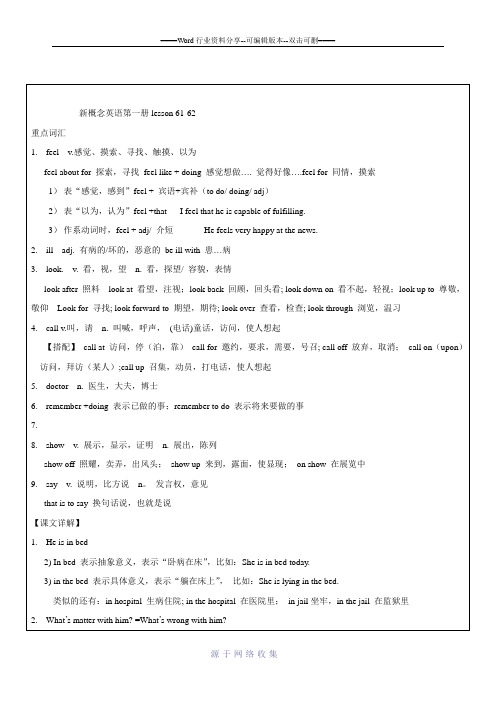
(3)He was ill,so he didn't go to school (本句是一个由并列连词so连接的并列句)
(4)He didn't go to school because he was ill.(本句是一个由从属连词because引导的主从复合句)
2.连系动词(link verb)是动词的一种,它本身有词义,但不能单独用作谓语,后便必须跟表语构成系表结构,一起来充当句子的位于。
3)作系动词时,feel + adj/介短He feels very happy at the news.
2.ill adj.有病的/坏的,恶意的be ill with患…病
3.look. v.看,视,望n.看,探望/容貌,表情
look after照料look at看望,注视;look back回顾,回头看; look down on看不起,轻视;look up to尊敬,敬仰Look for寻找; look forward to期望,期待; look over查看,检查; look through浏览,温习
8. It ____that he was late for the train.A. looks B. turns C. gets D. seems
9. These apples taste_____.A. to he good B. to be well C. well D. good
新概念英语第一册第61-62课:A bad cold

Lesson 61 A bad cold重感冒
Listen to the tape then answer this question.What is good news for Jimmy?
听录音,然后回答问题。吉米有什么好消息?
MR WILLIANMS: Where's Jimmy?
威廉斯先生:吉米在哪儿?
MRS WILLIAMS: He's in bed.
威廉斯夫人:他躺在床上。
MR WILLIAMS: What's the matter with him?
威廉斯先生:他怎么啦?
MRS WILLIAMS: He feels ill.
威廉斯夫人:他觉得不舒服。
MR WILLIAMS: He looks ill.
威廉斯先生:他看上去是病了。
MRS WILLIAMS: We must call the doctor.
威廉斯夫人:我们得去请医生。
MR WILLIAMS: Yes, we must.
威廉斯先生:是的,一定得请。
MR WILLIAMS: Can you remember the doctor's telephone number?
威廉斯先生:你还得医生的电话号码吗?
MRS WILLIAMS: Yes. It's 09754.
威廉斯夫人:记得。是09754。
DOCTOR: Open your mouth, Jimmy. Show me your tongue. Say, 'Ah'.
医生:把嘴张开,吉米。让我们看看你的舌头。说“啊——”
MR WILLIMAMS: What's the matter with him, doctor?
- 1、下载文档前请自行甄别文档内容的完整性,平台不提供额外的编辑、内容补充、找答案等附加服务。
- 2、"仅部分预览"的文档,不可在线预览部分如存在完整性等问题,可反馈申请退款(可完整预览的文档不适用该条件!)。
- 3、如文档侵犯您的权益,请联系客服反馈,我们会尽快为您处理(人工客服工作时间:9:00-18:30)。
We must call the doctor.
He looks ill.
Yes, we must.
Grammar 语法
call on +某人 拜访某人 call at+某地 拜访某地
I called on the Smiths yesterday. 我昨天拜访了史密斯一家人。 I called at the Smith's yesterday. 我昨天去了史密斯家。 I called on the doctor yesterday. 我昨天去拜访了医生。 I called at the doctor's yesterday. 我昨天去了医务室。
must 和 need 区别
must的意思是必须,表示主观身上的命令,以及推断。 need的意思是需要,表示客观需要。 问句: Must I stay here? 我必须得待这儿吗? No, you needn't. 不,你不必。 否定句: I mustn’t go there. 我不用去那儿 He needn’t to go there. 他不需要去那儿
feel
⑴ 觉得;感到: • She feels tired and thirsty. 她感到又累又渴。 • He is feeling a little better today. 他今天感觉好点了。 ⑵ 摸,触;(客体)给人的某种感觉: • The silk feels very smooth. 丝绸摸上去很滑爽。
He looks friendly. 他看起来很友好 I feel very happy. 我感到很开心 The food smells good. 食物闻起来味道很好 It tastes delicious. 吃着太美味了 That sounds a good idea. 听起来是个不错的主意
系动词的用法
remember
Xiaoxin,rem ember to eat lunch!
remember sth. 记得…… • Do you remember the doctor’s telephone number? • 你记得医生的电话号码吗? remember to do sth. 记得去做某事
• Please remember to buy some vegetables on your way home.
• • • • •
(2)状态系动词: 用来表示主语状态,只有be一词 He is a teacher.他是一名教师。 (3)持续系动词: 用来表示主语继续或保持一种状况或态度, 主要有keep,rest, remain,stay,lie。 • He always kept silent at meeting. 他开会时总保持沉歌 • This matter rests a mystery。 • 此事仍是一个谜
• feel+形容词
look
• • • • • • • • have/take a look look after look for look up look at Look forward to Look out Look back 看一看,瞧一瞧 照顾,照料 寻找 查找 看 盼望 当心,小心 回顾
How many cookies could a good cook cook if a good cook could cook cookies? A good cook could cook as much cookies as a good cook who could cook cookies. 如果一个好的厨师能做小甜饼,那么他能做多少小甜饼呢? 一个好的厨师能做出和其它好厨师一样多的小甜饼。
情态动词must can’t may 表示可 能性的区别
• must 一定…… 用于肯定句中,表示可能性最大; • The light is on, she must be at home now. 灯亮着,她现在一定在家。 • can’t 不可能…… 用于否定句中,表示可能性最大; • That girl can’t be Kate, I saw her in the shop just now. 那个女孩儿不可能是Kate,我刚刚看见她在商店里。 • may 可能…… 由于肯定句中,表示可能性最小; • He may come here today, I’m not sure. 他今天有可能来这里,我不是很确定。
• 连系动词(link verb)是动词的一种,它本身有词 义, 但不能单独用作谓语,后边必须跟表语构成系 表结 构,一起来充当句子的谓语。 • 最常见的连系动词有以下几种类型: • (1)感官动词: • 主要有feel. smell,sound,taste,touch等. • This kind of cloth feels very soft. • 这种布手感很软。
telephone
n. 电话
telephone number 电话号码 telephone call 电话 She always gives me a telephone call on Sundays.
v. 打电话给...
telephone sb 打电话给某人 telephone the lawyer 打电话给律师
cold a.冷的
• 反义词:hot 热的 • 俚语:I have cold feet. 我很紧张。 • cold n. 感冒 • have a cold 患感冒 • Do you have a cold? 你感冒了吗?
tongue 舌头
mother tongue n. 母语 e.g.. Chinese is my mother tongue. What's your mother tongue? tongue twister 绕口令
Lesson 61 A bad cold 重感冒
New words and expressions
• • • • • • • • • • • • feel look must call doctor telephone remember mouth tongue bad cold news v. 感觉 v. 看(起来) modal verb 必须 v. 叫,请 n. 医生 n. 电话 v. 记得,记住 n. 嘴 n. 舌头 adj. 坏的,严重的 n. 感冒 n. 消息
look
watch
see
look at
1. Please ___________ your homework. look at see 2. Can you ___________ the cat under the chair? watches 3. My father ___________ the Evening News every evening. look 4. You ___________ unhappy! 5. All the children are ___________ looking at the teacher now.
(4)变化系动词: • 表示主语变成什么样主要有become,grow,turn,fall, get, go, come,run。 • He became mad after that. 自那之后,他疯了。 • She grew rich within a short time. • 她没多长时间就富了。 • 注意:很多连系动词都是既可以当连系动词又可以当实义 动词的,但用法和词义有所不同。 • 比如look: • (1)看(实义动词): • Look at my hand. 瞧我的手. • (2)看起来,看上去(连系动词) • She looks tired.她看起来累了
Can you remember the doctor's telephone number?
Yes. It's 09754.
Open your mouth, Jimmy. Show me your tongue. Say, "Ah'.
What's the matter with him, doctor?
• call v.叫,请 • call the doctor 请医生 • You must call the doctor. 你必须请医生。 • call sb. at + 电话号码
给某人某个电话号码打电话
Call
• Please call my mother at 123. 请给我妈妈123打电话。
TEXT
He’s in bed.
Where’s the Jimmy?
He feels ill.
What's the matter with him?
Grammar 语法
1. be in bed 躺在床上 stay in bed 呆在床上 go to bed 上床睡觉 e.g. He is ill in bed. 他卧病在床 2. what‘s the matter with… = what’s wrong with… 某某怎么了?XX出什么问题了? What's the matter with she?她怎么了? What's the matter with her?
He has a bad cold, Mr. Williams he must stay in bed for a week.
That's good new for Jimmy.
Good news? Why?
Because he doesn't like school!
Grammar 语法
1. ache后缀,加在某个身体部位后表示哪儿疼 2.have和表示疾病的名词连用,表示“得了”某种疾病,例如: have a cold 感冒 have a bad cold 重感冒 have flu 患流行性感冒 have a temperature 发烧 have a toothache 牙疼 have a headache 头疼 have an earache 耳朵疼 3. take the medcine 吃药
look, look at ,see, watch 的区别:
look 看起来,后面加形容词,是连系动词; You look sad today. look at 看, 是动词短语后面加名词或代词,强调看的动作或过程; Please look at her. 请看她 see 看见,后面加名词或代词,强调看的结果,是实意动词; I can’t see the bird in the sky. watch 观看,后面加名词,强调欣赏,是实意动词; They are watching the football match.
may
can’t
must
may 1. —Who’s that? —That ___________ be Jim, but I’m not sure. 2. That textbook ___________ be David’s, because his must name is on it. must 3. You ___________ be very tired after so much hard work. may 4. —Where’s my key? —It ___________ be in your handbag. can’t 5. You ___________ kn来自百度文库w her name, because she is our new student.
• 请记得在你回家的路上买一些蔬菜。 remember doing sth. 记得做过某事
bad a. 坏的,严重的;
• • • • • be bad for 对……有坏处 Watching TV too much is bad for your eyes. 看太多电视对你的眼睛有坏处。 反义词:good 好的 be good for 对......有好处
系动词的用法
1. 系动词一般用在主语后面,后面跟形容词,用来修饰说明主语。 2. 句子结构: 主语+系动词+形容词 3.主语是第三人称单数时,系动词要用三单形式 4.不同时态里,系动词的形式要变化。 系动词: feel(感觉) look(看起来) taste(尝起来) smell(闻起来) sound (听起来)
